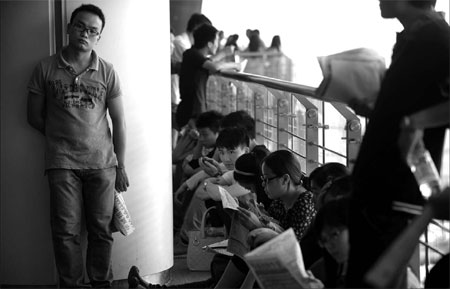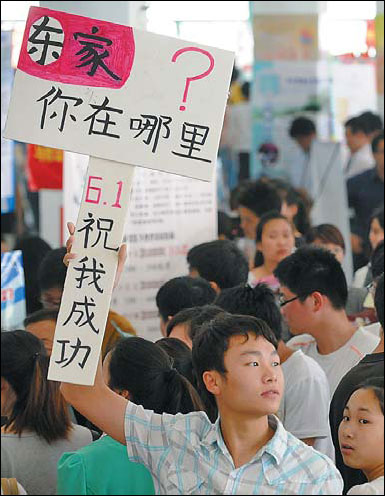Graduates face grim hunt for work
Updated: 2013-07-03 08:03
By He Na (China Daily)
|
|||||||||||
|
Above: College graduates take a break at a job fair in Chongqing in May. The fair offered 20,000 vacancies at 500 businesses. Below: Animal husbandry and veterinary science graduates search for job opportunities at a fair held in Zhengzhou, capital of Henan province. Yu Xiao / for China Daily |
|
Zhang Tao / for China Daily |
|
A college graduate holds a placard with Chinese characters that read "Where are you, my boss?" at a job fair in Bozhou, Anhui province. Zhang Yanlin / for China Daily |

Hopes dashed as record numbers of new job seekers flood market, reports He Na in Beijing
Liu Xiaohong boarded a Beijing-bound train in Changchun, capital of Jilin province, on the morning of June 24. Amid tears, cheers and a great deal of ruined makeup, Liu's classmates helped her lift a large suitcase, containing mementos of the past four years, onto the luggage rack.
"I'll let you know as soon as I find a job, and you guys should do the same," said Liu as she cried and waved from the window.
The train was crowded and the crush of people standing in the corridors reminded her of the annual Spring Festival travel rush.
There were many young faces in the carriage, and Liu believed that, like her, they were recent graduates, heading to Beijing to embrace a new, but unknown, life.
A record 6.99 million students graduated from colleges across China this year, an increase of 2.8 percent from 2012, according to the Ministry of Education.
Liu, who has just graduated from Jilin University with a graphic design degree, was heading to Beijing for the third time since November. Like numerous other graduates, she spent her time in the capital attending job fairs.
The 24-year-old has dreamed of becoming a full-time artist since childhood. She chose graphic design four years ago because at the time it was a popular major with promising prospects.
"I never thought I would fail to find a job, but that's what has happened. I was determined to find a job in a large design institute. However, after attending several large job fairs at campuses in Changchun and other cities, I felt desperate," Liu said.
The more job fairs she attended, the wider the gap between hope and reality became.
"There were very few companies seeking people like me, and most of them were small firms I had never heard of."
There were 18 students in Liu's class, and most are still looking for jobs. Many are planning to move to larger cities where they believe the opportunities will be more plentiful.
Between October and April, the average employment rate for graduates with bachelor's degrees stood at 35 percent, a decline of 12 percent compared with the same period last year, according to a poll of 50,000 graduates conducted by MyCOS Research Institute, a Beijing higher education consultancy, and the Internet company Tencent.
Poor job satisfaction
The harsh reality engendered by China's economic slowdown has exerted huge pressures on graduates and resulted in a low rate of job satisfaction.
Wang Zengtian, a computer graduate, also from Jilin University, is among those left out in the cold.
Born into a farming family in a small village in Nanyang, Henan province, Wang vowed to change his destiny from the first day he entered the university. He targeted a multinational IT company, which employed a number of graduates from his college last year. As one of the top students in his class, Wang believed he stood a good chance of being offered a job.
However, the company has reduced its graduate recruitment quota; in 2012, it employed 20 new graduates, but this year the number has been whittled down to just six.
Wang was devastated by the news. "I'd even planned how I would introduce myself to my new colleagues. It's really a huge blow. For quite a few days, I doubted my ability and even questioned my own worth," he said despondently.
He sent out resumes to every company he could think of and attended as many job fairs as possible. Eventually, he gained a job at a bank, having overcome the strict selection procedures.
According to Wang, not one of his former classmates is satisfied with the offers they've received, because the terms are not as good as those offered last year.
The straitened job market has also forced many third-year undergraduates, known as juniors, to act earlier.
Qiu Xue, 21, a junior at Xi'an University of Posts and Telecommunications in Shaanxi province, was one of the early birds, but her efforts were to no avail.
"I know some of this year's graduates from my college and I felt very nervous when I heard that many of them still haven't found jobs, including the vice-president of our students' union," she said.
In the hope of gaining work experience and improving her chances when she graduates next year, Qiu contacted several companies looking for work as an intern, but offers were not forthcoming.
"It's even hard to find a place as an intern, let alone a real job," she sighed.
Low job satisfaction
Li Yang, director of the Vocational Counseling Center at China Agricultural University, said he has sensed a change in recruitment patterns.
"Many large companies that cooperated with our university have trimmed their recruitment quotas considerably because of the economic slowdown," he said.
"We used to set high standards when selecting the companies allowed to recruit graduates at our campus job fairs. But this year, we've had to lower the bar and a greater number of companies have become involved. We just haven't had enough applications from large, well-known businesses."
Usually, the university's last campus job fair is held in May. However, this year, in response to student demand, the college hosted a second large fair in mid-June.
"The results of the last fair seem to have been positive, although the final statistics are not yet available. The employment rate is likely to be similar to last year, but the job satisfaction rate is much lower," Li said.
Yang Shucheng, director of the Vocational Counseling Center at Dalian University of Technology in Liaoning province, expressed similar concerns.
"The days of waiting at the office for employers to approach us are over. To help students find jobs and attract businesses to our campus job fair, the school mobilized all the teachers and also asked alumni to invite their employers," Yang said.
"Every year, approximately 65 percent of our graduates choose to work in Northeast China and so regional economic development plays a major role in our employment plans," he said.
"Generally, mechanical engineering majors are in great demand, and several well-respected machinery manufacturers in Dalian employed a large number of graduates. But unfortunately, some of them have filed for bankruptcy this year. What's worse, many Japanese businesses in the city have also cut staff numbers, thus hampering many students' plans," he added.
In addition to China's economic slowdown, Yang said the disparity between supply and demand has exacerbated the rise in graduate unemployment levels.
Many companies based in the less-developed western region have failed to fill their employment quotas because a large number of students rate location as a top priority and have high expectations of working in big cities and for State-owned enterprises and governments, he said.
Young people in China will continue to face tough employment pressure in the coming five years, with the annual number of college graduates staying at around 7 million, according to data from the Ministry of Human Resources and Social Security.
The Worker's Gymnasium in Beijing holds job fairs four days a week, throughout the year, except on national holidays. The fairs mainly attract small and medium-sized companies.
However, on one late-June morning, many of the booths were unattended and the recruiting staff dozed at their desks.
Cui Jinjin, a human resources manager at a real estate company in Beijing, signed just four graduates at a fair held on June 21.
"Many new graduates consulted us, but I think most of them were asking just for fun. The salary we offer new graduates is no lower than for office workers, but they feel that earning a living by selling houses is not commensurate with their status as college graduates," Cui said.
Qin Hao, deputy general manager of Jiangsu Allyrise Pharmaceutical Co, echoed that viewpoint, saying the shortage of labor has become a long-term headache.
"I like hiring new graduates because we can train them to become the staff we want them to be. But these 'kids' demand too much in terms of salaries, social healthcare and future promotion instead of expressing a willingness to learn and demonstrate their passion for the company," he said.
Jiangsu Allyrise Pharmaceutical had interviewed more than 300 applicants by the end of May, and half of them were new graduates. However, the graduate applicants only accounted for a small proportion of the 63 workers eventually recruited.
"We prefer people with slightly lower educational backgrounds. They are willing to work hard and make fewer demands on their employers," Qin said.
Yang Weiguo, vice-director of the China Institute for Employment Research, attributed the problem to a failure in the higher education system, saying China's economic structure is at a comparatively lower level and is highly labor intensive. The pace of structural updating doesn't match that of economic growth.
"Although we have made great achievements in aerospace and supercomputers, they do not weigh much in the economic structure. It simply means that companies don't need so many highly qualified workers. Why do factories bother to recruit college students to do a job that can be mastered in just a few days?" he said.
Policy initiatives
The grim employment prospects for graduates have become a social problem and the issue has attracted attention nationwide.
In response, the central government has rolled out policies and measures to boost employment, such as increasing the number of jobs in the western regions and encouraging entrepreneurship.
However, Tang Min, vice-director of Youcheng China Social Entrepreneur Foundation, a nonprofit foundation, said the measures will only be effective over the short term. In the long run, the problem will only be solved by reform of the college system.
Tang suggested that Chinese colleges should adopt European methods and introduce vocational education so students can obtain practical skills to supplement their theoretical knowledge.
"Instead of providing experimental and scientific subjects to cultivate the skills society urgently needs, many universities simply provide low-cost subjects such as finance and law," he said.
"Does our society really need so many economists and executives? The reform should be carried out soon, the sooner the better. Otherwise, the grim employment prospects will continue and that will definitely affect social stability."
Han Junhong and Yu Ran contributed to this story.
Contact the writer at hena@chinadaily.com.cn
(China Daily 07/03/2013 page5)
Today's Top News
Beijing looks to enhance ties with European nations
'Positive' sign on Asia-Pacific free trade pact
Venezuela eyed as Snowden's asylum
FM responds to Manila's accusations
Credit crunch hits smaller firms
Chinese firms eye strong EU brands
China faces long battle in drug crackdown
Sea center looking for candidates
Hot Topics
Lunar probe , China growth forecasts, Emission rules get tougher, China seen through 'colored lens', International board,
Editor's Picks

|

|

|

|

|

|








